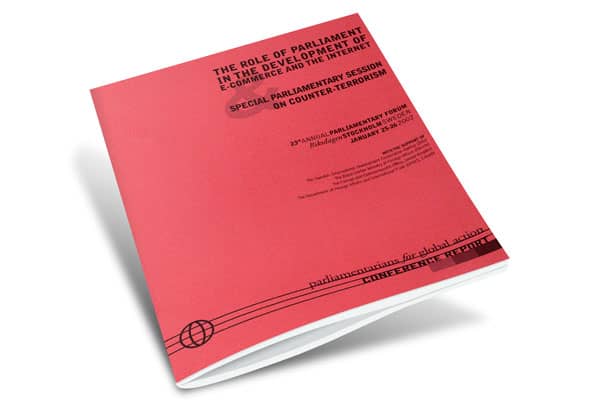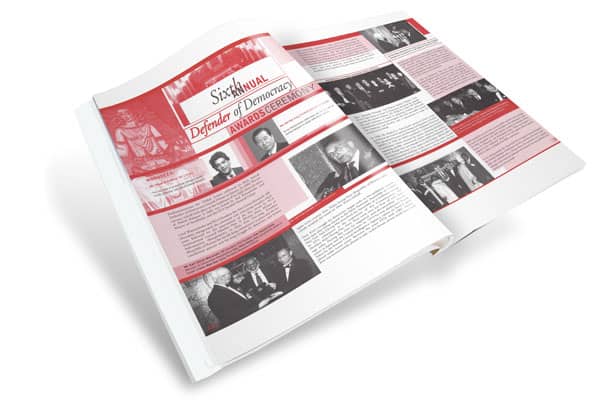The 23rd Annual Parliamentary Forum on The Role of Parliamentarians in the Development of E-commerce and the Internet & Special Parliamentary Session on Counter Terrorism took place at Riksdagen, Stockholm, Sweden on January 25-26, 2002. Due to the tragic events of September 11th the Forum, initially planned for the end of the 2001, was postponed and instead of focusing solely on the topic of e-commerce, was changed to include a special parliamentary session on counter-terrorism. This session culminated in a declaration by parliamentary participants that called for a joint international initiative to address the root causes of terrorism and undertake effective political, social and economic measures aimed at preventing and combating terrorist networks.
The Role of Parliamentarians in the Development of e-Commerce and the Internet
Opened by Mr. Karl-Goran Biorsmark, MP (Sweden); PGA President, Hon. A. Moyeen Khan, Minister of Information (Bangladesh) and Dr. Bruno Lanvin, Executive Secretary, DOT Force ofThe World Bank the first day of the 23rd Annual Forum was devoted to power and potential of e-commerce and the Internet; means of its management for the benefit of the economy and society; the relationship between e-commerce, the government, civil society and business sector, and protection of workers, consumers and political entities involved in electronic transactions. Participants have stressed the role of the Internet in bringing people and parliamentarians together, facilitating international communications and promoting commercial and economic development. However, the potential for development possessed by e-commerce has been severely hampered by wide and difficult to bridge, developmental gap that prohibits countries to realise their electronic networking capacity and utilize e-commerce to its fullest extent.
This problem of so-called 'digital gap' and such means of dealing with it as educational reforms, trust-building strategies, governmental involvement and security issues became the focal points of the day's discussions. On numerous occasions the panellists have stressed the importance of parliamentarian participation in establishing a comprehensive body of legislation that would regulate the development of e-commerce and provide for its security and ease of access. The necessity of international legal framework regulating online transactions and establishing the binding law of the Internet was offered as one of the trust-building and security-enhancing solutions capable of bridging the gap.
Examples of particular logistical and legislative issues arising in consequence of e-commerce spread in such countries as Russia, India, Cote d'Ivoire were presented to the Forum by Mr. Sergey Glazyev, MP (Russian Federation), Mr. Suresh Keshwani, MP (India) Dep. Molle Molle, VP of National Assembly (Cote d'Ivoire).
The final session of the day was devoted to discussion of positive and negative elements of e-commerce and e-communication developments on civil society and overall security problems associated with simple consumer transactions, discussed by Ms. Britta Lejon, Minister of Democratic Issues, Public Administration and Consumer Policies (Sweden), e-based voting frameworks analysed by Ms. Kate Sullivan, an Associate of International IDEA, and Internet role in human trafficking discussed by Ms. Helena Bargholtz, MP (Sweden). While opening new venues to such criminal activity as human trafficking, the electronic domain has modified the concept of political speech, thus transforming the capacities of democracy itself Although, as concluded by Ms. Sullivan comprehensive legislature covering extra-territorial domain and enforceable internationally is still to be worked through, the potential benefits of the digital world are enormous.
Special Parliamentary Session on Counter-Terrorism
Opened by a keynote address entitled "The Globalization of Rights and Human Development" of Hon. Francesco Rutelli, Leader of the Opposition in the Italian Parliament, The Special Session on Counter-Terrorism provided an analysis of such counter-terrorist means as conflict resolution; building sustainable, healthy, thriving communities; education and opportunity for women; legal measures to combating the root causes of terrorism: war, poverty, disease, endangered environment and inequality.
The speakers emphasised that in order to be fully eradicated, international terrorism must be targeted with the tools that eliminate development debt, promote international foreign aid, establish universal justice mechanisms and put forward peace-building efforts similar to those undertaken by PGA's Task Force on Peace and Democracy in Africa, South-Eastern Europe and South Asia. A wide cooperative framework between the international organisations and parliamentarians worldwide should become the cornerstone of collaborative and successful anti-terrorism campaign.
Education and Opportunity for Women
As one of the major causes of terrorism, inequality must receive special attention from international policy-makers. The terrorism-producing inequality measures not only on the level of races or nations, but exists between the groups of the same society in a form of discrimination against minority groups and women. The aims of good governance and democracy that are prerequisite to eradication of terrorism cannot be achieved without proportionate participation of women in the governmental and social affairs of their nations, stressed the speakers on this panel, Dep. Victoire Ndikumana (Burundi), Hon. Theresa Ameley Tagoe, MP, Deputy-Minister of Housing and Works (Ghana), Dep. Oumou Ba Sangare (Mali), Mrs. Elisavet Papadimitriou, MP (Greece). Such participation is to be achieved by enlightening women on democratic processes and principles, promoting their awareness of the civil society and governmental policies, allowing them to raise their voices in political and social environments of their countries.



